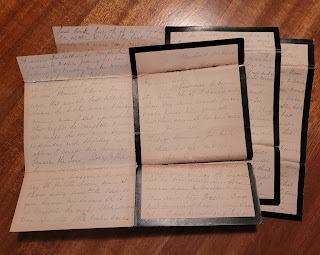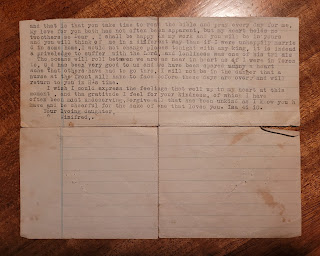By Jennifer Z. Major
By "a few" I mean three full stories of her belongings, plus the full basement, in an old Victorian home in Vancouver.
One of those "things" is her ancient portable Corona typewriter. It's in my new office with all my books, some important trinkets of my travels, and a room full of peace and quiet.
Another one of those things we inherited is the table upon which I'm typing on my sturdy HP laptop, which is 100 years of technology ahead of that old , gracious Corona. It's a 50 inch round, Empire Era Sapele (ribbon mahogany) dining table, with a thick centre post, and four smaller corner posts, and a footrest. It's a bit of a collector's item. I sent of photo of it to Antiques Roadshow US and they went a bit squirrely over it. I'm thrilled that the table that Winifred used as she hosted and fed people in her giant Victorian rooming house in Vancouver is now part of my storytelling career.
Anyway, so why do I call her Winnifred The Brave?
Well, the first hint is the typed letter was written in 1918.
Miss Winnie packed up a steamer trunk (yes, I have that, too), snuck out of Newboro, made it to Kingston, then made it to (I think) Montreal, jumped a ship, and sailed to Africa to become a missionary.
But wait, what was happening in 1918?
At the time, they called it "The War to end all wars".
Even though the Armistice would come that November, World War One was still ravaging the planet, and the shipping lanes were prime targets. But her calling was stronger than anything that could hold her back, including the very real possibility of going down with the ship during a sea battle.
When I read it, I had to try and keep it together.
These letters were typed on "my" Corona, left in the house, and discovered by her parents after she'd snuck out in the middle of the night.
Can you imagine their emotions? Their daughter, who was probably less than 25 years old, had run away from home to cross the world and serve somewhere in Africa.
As you can see in the letter, she had a vague idea of what she was getting herself in for. But I doubt, with everything in me, that she had any idea of the life ahead of her.
Here's to you, Winnifred, for being braver than the doubt, stronger than the fear, and more faithful than the naysayers ever thought you were capable of.
Can you imagine their emotions? Their daughter, who was probably less than 25 years old, had run away from home to cross the world and serve somewhere in Africa.
As you can see in the letter, she had a vague idea of what she was getting herself in for. But I doubt, with everything in me, that she had any idea of the life ahead of her.
Here's to you, Winnifred, for being braver than the doubt, stronger than the fear, and more faithful than the naysayers ever thought you were capable of.
~~~~~~~~~~~~~~~~~~~~~~~~
Jennifer Zarifeh Major is a direct descendent (on her mother's side)of Oman Norquay, who arrived from the Orkney Islands on ship to Hudson's Bay in 1830, and his Cree wife Mary. Her father is an Arab immigrant who grew up on a street named after a man who served with Lawrence of Arabia.
She writes historical fiction based on Navajo history. You can find her on Twitter under @Jjumping and on Instagram under Jennifermajorwriter, and at www.jennifermajorbooks.com.






Thanks for posting! So, was Winnifred a relative of yours, or did you just happen to buy that house? It's awesome that you got her personal effects. We bought a house full of possessions once, but an auction company had been hired to come and take anything of value. I would have loved some of the pieces the owner had, not even the antiques but some of the items that just seemed to belong there. Winnifred was very brave!!
ReplyDeleteWinnifred was my dad's landlady before he married my mom and adopted us, and she made him her executor before she passed away in the late 70s. She left everything in the house to him, but the house was sold and the money given to missions. Every floor was a treasure hunt, and oh my word, the boxes in the basement held so many cool things! Including all of her wire-rimmed spectacles!
DeleteWhat a wonderful heritage you have! I'm happy to discover you because I love books with Navajo characters. Tony Hillerman's books unleashed a fascination and addiction. I'm always looking for authors who write faithfully about the Navajo.
ReplyDeleteThank you!! I do my best! Otherwise, Ted Charles would correct me!
ReplyDelete